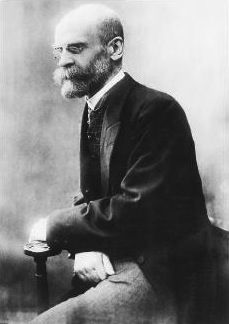Law and Crime
Serial Murder and Functionalism
An unexpected but useful combination.
Posted October 20, 2019 Reviewed by Lybi Ma

If I wanted to be controversial, as a sociologist, I might say that serial murder is “functional” for society. However, a less inflammatory way to say the same thing is that serial murder can be understood (at the macro-level of society) by examining it through the lens of the functionalist tradition of sociology.
Functionalism has been a dominant force in sociology since the emergence of the discipline in Europe during the nineteenth century and is based largely on the work of legendary French social scientist Emile Durkheim. According to the functionalist theoretical perspective, society is held together by social consensus, or cohesion, in which members of society agree upon—and work together to achieve—what is best for all of society.
Durkheim argued that crime and deviance are inevitable in any society and that limited crime and deviance is actually functional for society. Regarding the inevitability of crime, Durkheim stated that because there cannot be a society in which the individuals do not differ to some extent from the collective type or average member, it is also inevitable that among the deviations there will be some individuals with criminal character.
Durkheim further believed that human desires such as lust and greed are insatiable and omnipresent. Because individuals in society aspire to everything and demand constantly more, they are never satisfied. Durkheim said that crime and deviance, including murder, become inevitable social facts in such an environment.
Durkheim argued that because crime is found in every society, it must be normal and provide a useful function. He developed a functionalist perspective of crime, claiming that it is actually necessary because criminal behavior promotes clarification of the moral boundaries that define society.
The moral bonds that unite society are strengthened when boundaries are clarified and reinforced, according to Durkheim. He believed that moral bonds were vital to society’s proper functioning. Durkheim believed that without moral bonds individuals would be compelled by their passions into a mad search for gratification but each new gratification would lead only to more and stronger desires.
According to Durkheim, the one thing that every human will always want is more. He believed that if society does not provide limitations, individuals will become slaves to the pursuit of more. Thus, according to Durkheim, crime helps society to define and delineate its collective consciousness and establish proper limitations.
From a functionalist perspective, Durkheim identified several key social benefits of criminal behavior. Arguably, the most important is that the identification, apprehension, and punishment of criminals clarify the limits of acceptable behavior in society. When a criminal is punished it communicates to the other members of society that such behavior is unacceptable and will not be tolerated.
In addition, from a functionalist perspective, crimes that are punished most severely by society are generally those that violate the most deeply cherished values of the community.
For example, punishment for murder is typically the most punitive administered in any society because of the high value placed on human life. The harshness of punishment for murder helps to clarify and reinforce society’s general attitudes concerning the act of murder. Society adopts and emulates beliefs about which crimes are most reprehensible based on how harshly violations of those crimes are punished.
The functionalist tradition of sociology provides useful insights into the presence of serial killers in modern society. In particular, it offers powerful insights into their actions. Durkheim said that human nature is characterized by limitless passions and appetites. He also said that without clearly defined moral boundaries and proper regulation in society, individuals will engage in a never-ending pursuit of self-centered gratification.
This certainly applies to serial killers who are completely driven by insatiable wants and desires. Although the motivations and needs of the wide array of serial killers are varied and complex, there is one psychological characteristic that is common to them all—an insatiable need to kill other human beings. Stated differently, serial killers commit murder simply because they enjoy it and are unable to control their compulsion to do so.
Consistent with Durkheim’s concept of anomie (i.e., a condition where social norms or expectations of behavior are confused, unclear, or simply not present) serial killers—particularly those who are psychopaths—lack a moral bond to society that restrains individual behavior. Durkheim believed that individual members of society must have a strong moral bond to one another to control their impulsive behavior that he called “insatiable passions.”
If insatiable passions lie at the core of every human, as Durkheim said, then the psychological and physical gratification that serial killers gain from the act of murder reinforces and fuels their homicidal behavior. Durkheim would say that because the powerful desires of serial killers are never fully satisfied, they are compelled to commit the act of murder again and again.
Similar to drug addicts or alcoholics whose needs increase over time with usage, the need for serial killers to murder increases as their victim count increases. For example, the appetite for blood of prolific serial killers such as Ted Bundy, Gary Ridgway, and Jeffrey Dahmer was never fully satisfied and their need to kill actually increased over time.
Emile Durkheim would say that individuals who commit serial homicide lack the moral restraints that society establishes through its collective consciousness. As such, serial killers can be seen as social misfits or moral outsiders who seek to gratify their selfish and impulsive desires without regard for society’s rules as defined by the collective consciousness.
The collective consciousness refers to the general structure of shared understandings, norms, and beliefs in society. According to Durkheim, the totality of beliefs and sentiments common to all citizens of the same society form a regulatory system that has a life of its own. The collective consciousness can be understood as a shared morality system in society. The collective consciousness exists at the societal level but it regulates behavior at the individual level. More to the point, the collective consciousness of society regulates the behavior of normal individuals. However, serial killers are not normal individuals.
Durkheim fully recognized that some individuals are not connected to the collective consciousness and, as a result, may display behavior that is dangerous to society as a whole. According to Durkheim, people who commit terrible crimes—which would include serial murder—are lacking an awareness of the collective consciousness of society. If he was alive today, I believe Durkheim would say that the harsh punishment of serial killers, once they are caught, clarifies the moral boundaries of society and thus serves an important function for all.




